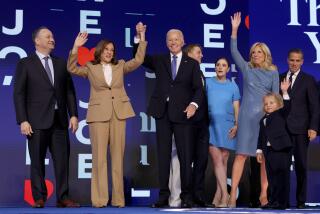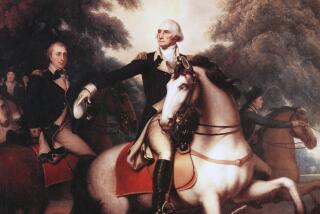Inauguration: A Time to Celebrate New Beginnings : To presidents, ceremony has symbolized different things. For Clinton, it could help impart an aura of authority.
WASHINGTON — Historian Leo Ribuffo was driving along Pennsylvania Avenue with his wife just after New Year’s when their attention was drawn to row after row of empty bleachers on the sidewalk.
It must have been quite a First Night celebration, they thought.
But they quickly realized this had nothing to do with the New Year. This was not about debauchery; it was about democracy. This was about the inauguration of the president of the United States.
Once again, the towering parade reviewing stand--bullet-resistant glass and all--is being built in front of the White House.
The structure signals a grand celebration--$30-million worth of celebration this year. But with a sitting president about to continue in office, it also poses this question: Suppose they gave an inaugural and nobody came?
“The guy can have a drink with his wife and place his hand on a Bible,” swear to preserve, protect and defend the Constitution and be done with it, Ribuffo, a history professor at George Washington University, wondered out loud.
After all, such a perfunctory approach would serve the required constitutional purpose--the administration of the 35-word oath of office--while keeping in perspective the reality that it signals little in the way of change.
But, Ribuffo said, that would be missing the point.
“The reason we’re going through it,” he said, “is that every society needs pomp and circumstance and ceremony, and that is true of a democracy--maybe especially true of a democracy. Attention to civic concerns and attention to government is so slight in the United States that a ceremony every four years highlighting the majesty of democracy is a good thing.”
Benjamin Harrison put it more formally, but the point was the same, when he was inaugurated in 1889:
“[F]rom the beginning of the government the people, to whose service the official oath consecrates the officer, have been called to witness the solemn ceremony. The oath taken in the presence of the people becomes a mutual covenant. The officer covenants to serve the whole body of the people by a faithful execution of the laws, so that they may be the unfailing defense and security of those who observe them.”
Twelve years ago, Ronald Reagan was sworn into office for a second term at midday on Jan. 20, just as the 20th Amendment to the Constitution dictates. But rather than carry out the spectacle on the steps of the Capitol on that day, a Sunday (and Super Bowl Sunday at that), an oath-taking ceremony was conducted in the grand foyer of the White House before a small group of only the most senior members of government and Congress and members of the president’s family. Call it the second-marriage syndrome--generally a less-showy affair.
The more celebratory inaugural was scheduled for the next day when, it turned out, the weather grew so frigid that for safety reasons the reenactment of the official ceremony was moved indoors at the Capitol and the traditional parade was canceled.
The president who returned to work on Jan. 22 was the same man who had occupied the Oval Office on Jan. 19. Nothing changed. The Republic stood. Only the hoopla had fallen.
For Clinton, the inaugural provides opportunities that come in handy for a president twice elected by less than 50% of the vote. He needs the aura of authority that the full ceremony imparts.
“His mandate comes from the 25% of the American population who voted for him,” said Michael K. Deaver, who oversaw Reagan’s 1985 inauguration. “If I were in their shoes, I’d say it is time to bring the country together. It’s not time for a week of festivities.”
In 1913, Woodrow Wilson offered a less-than celebratory tenor. He decided that his inauguration to his first term would be a day of dedication and national repentance. “He took away a lot of the fun,” said Lloyd Gardner, a professor of American history at Rutgers University.
Wilson’s message was one that appealed 64 years later to Jimmy Carter. But, Carter wrote in his memoirs, “a modern audience might not understand a similar call from me.” Instead, the message he chose--conveyed primarily in his walk along Pennsylvania Avenue to the White House--was one of stepping away from the isolation of the presidency and the arrogance that it can breed.
“Presidents regard [an inauguration] as a crucially important time to restart things,” Gardner said. “We are,” he added, “celebrating the rebirth of the head of state.”
More to Read
Get the L.A. Times Politics newsletter
Deeply reported insights into legislation, politics and policy from Sacramento, Washington and beyond. In your inbox three times per week.
You may occasionally receive promotional content from the Los Angeles Times.










